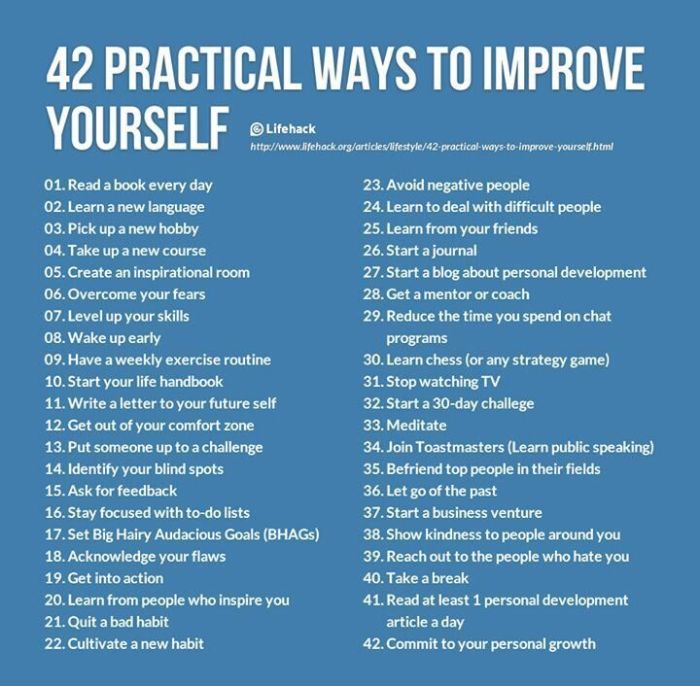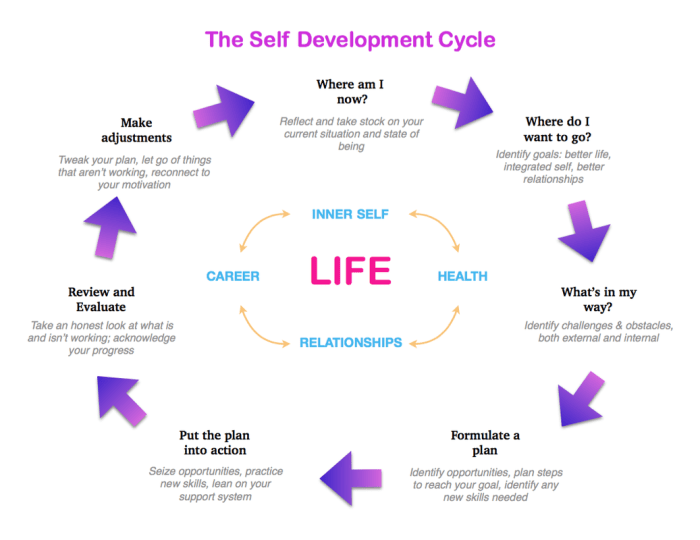Self-Improvement Tips are like the ultimate life hacks, helping you level up your game and become the best version of yourself. Get ready to dive into a world of setting goals, developing healthy habits, mastering time management, and boosting your mental well-being like a boss.
Are you ready to unlock your full potential? Let’s roll up our sleeves and get started on this epic journey of self-discovery and growth.
Introduction to Self-Improvement Tips
Self-improvement is all about taking steps to enhance oneself mentally, emotionally, physically, or spiritually. It involves setting goals, developing new skills, and working towards becoming the best version of yourself.Self-improvement is crucial because it allows individuals to grow, learn, and evolve. It helps in boosting self-confidence, improving relationships, and achieving personal fulfillment. By continuously striving to better oneself, one can unlock their full potential and lead a more fulfilling life.
Benefits of Incorporating Self-Improvement Tips into Daily Life
- Increased Self-Awareness: Self-improvement tips can help individuals become more aware of their strengths, weaknesses, and areas for growth.
- Setting and Achieving Goals: By incorporating self-improvement tips, individuals can set specific, achievable goals and work towards accomplishing them.
- Enhanced Productivity: Improving oneself can lead to better time management, increased focus, and overall productivity.
- Better Mental Health: Engaging in self-improvement activities can reduce stress, anxiety, and improve overall mental well-being.
- Improved Relationships: By working on personal development, individuals can enhance their communication skills, empathy, and understanding, leading to better relationships with others.
Setting Goals for Self-Improvement
Setting goals for self-improvement is crucial in order to grow and develop as an individual. By having clear objectives in mind, you can stay focused and motivated to work towards becoming the best version of yourself.When setting goals, it’s important to make sure they are realistic and achievable. Setting goals that are too lofty or unrealistic can lead to frustration and demotivation.
Start with small, attainable goals and gradually work your way up to more challenging ones.
Examples of Short-term and Long-term Self-Improvement Goals
- Short-term goal: Start a daily journal to reflect on your thoughts and emotions.
- Short-term goal: Practice mindfulness for 10 minutes every day to reduce stress and improve focus.
- Long-term goal: Complete a certification course in a skill you’re passionate about within the next year.
- Long-term goal: Run a marathon within the next two years by following a structured training plan.
Creating a Plan to Achieve Your Goals:
- Break down your goals into smaller, manageable tasks to make them less overwhelming.
- Set specific deadlines for each task to keep yourself accountable and on track.
- Track your progress regularly and celebrate small victories along the way to stay motivated.
- Adjust your plan as needed based on your progress and any unexpected challenges that may arise.
Developing Healthy Habits
Developing healthy habits is crucial for self-improvement as they contribute to overall well-being. By incorporating these habits into your daily routine, you can positively impact various aspects of your life.
Regular Exercise
Regular exercise is a key healthy habit that can improve physical health, mental clarity, and overall mood. Incorporating activities like walking, jogging, or yoga into your daily routine can help boost energy levels and reduce stress.
Healthy Eating
Maintaining a balanced diet rich in fruits, vegetables, lean proteins, and whole grains is essential for overall well-being. Avoiding processed foods and sugary drinks can contribute to better physical health and mental focus.
Adequate Sleep
Getting enough sleep is crucial for optimal health and well-being. Aim for 7-9 hours of quality sleep each night to improve cognitive function, mood regulation, and overall productivity.
Stress Management
Managing stress through techniques like meditation, deep breathing exercises, or mindfulness can significantly impact your overall well-being. Incorporating these practices into your daily routine can help reduce anxiety and improve mental clarity.
Hydration
Staying hydrated is essential for maintaining good health. Drinking an adequate amount of water each day can improve digestion, skin health, and overall energy levels.
Social Connections
Building and maintaining social connections is also a healthy habit that contributes to overall well-being. Spending time with friends and loved ones can reduce feelings of isolation and improve mental health.
Time Management and Productivity
Time management plays a crucial role in self-improvement as it allows individuals to allocate their time effectively towards personal growth and achieving goals. By mastering time management skills, individuals can enhance their productivity, reduce stress, and create more opportunities for self-improvement.
Strategies for Improving Productivity and Time Management Skills
Improving productivity and time management skills requires a combination of effective strategies and techniques. Here are some tips to help you maximize your time:
- Avoid multitasking: Focus on one task at a time to improve concentration and efficiency.
- Set realistic goals: Break down tasks into smaller, manageable goals to track progress and stay motivated.
- Use a planner or digital calendar: Organize your tasks and schedule to prioritize important activities and deadlines.
- Eliminate distractions: Identify and eliminate distractions such as social media, emails, or unnecessary meetings to stay focused.
Tips on Prioritizing Tasks and Setting Boundaries to Enhance Productivity
Prioritizing tasks and setting boundaries are essential for enhancing productivity and achieving self-improvement goals. Here are some tips to help you prioritize effectively:
- Identify urgent vs. important tasks: Focus on completing tasks that are both urgent and important first to avoid last-minute stress.
- Delegate tasks when necessary: Learn to delegate tasks to others to free up time for high-priority activities.
- Set boundaries: Establish clear boundaries with work, social commitments, and personal time to maintain a healthy work-life balance.
- Take breaks: Allow yourself short breaks between tasks to recharge and maintain focus throughout the day.
Mindfulness and Mental Well-being

Practicing mindfulness is a key aspect of self-improvement as it allows individuals to be fully present and aware of their thoughts, feelings, and surroundings. By cultivating mindfulness, one can enhance their mental well-being and overall quality of life.
Role of Mindfulness in Self-Improvement
- Decreases stress and anxiety levels.
- Improves focus and concentration.
- Promotes emotional regulation and resilience.
- Enhances self-awareness and self-compassion.
Techniques for Practicing Mindfulness in Daily Life
- Deep breathing exercises.
- Body scan meditation.
- Mindful walking or eating.
- Journaling thoughts and emotions.
Tips for Improving Mental Well-being through Mindfulness Practices
- Set aside time each day for mindfulness practice.
- Start with short sessions and gradually increase duration.
- Be gentle with yourself and practice non-judgment towards your thoughts.
- Incorporate mindfulness into daily activities such as showering or commuting.
Building Confidence and Self-Esteem
Confidence and self-esteem play a crucial role in self-improvement as they shape how we perceive ourselves and interact with the world around us. Building confidence and self-esteem can lead to a more fulfilling life and better overall well-being.
Strategies for Building Confidence and Self-Esteem, Self-Improvement Tips
- Set realistic goals: Break down big goals into smaller achievable tasks to boost confidence as you accomplish each one.
- Practice self-care: Take care of your physical and mental health to feel good about yourself and boost self-esteem.
- Acknowledge your strengths: Focus on your abilities and accomplishments to build confidence in your skills and talents.
- Avoid negative self-talk: Challenge negative thoughts and replace them with positive affirmations to improve self-esteem.
- Seek support: Surround yourself with positive and supportive people who uplift you and believe in your potential.
Tips on Overcoming Self-Doubt and Boosting Self-Confidence
- Acknowledge your achievements: Celebrate your successes, no matter how small, to build confidence in your abilities.
- Step out of your comfort zone: Challenge yourself to try new things and overcome fears to boost self-confidence.
- Practice self-compassion: Treat yourself with kindness and understanding, especially during setbacks, to improve self-esteem.
- Visualize success: Imagine yourself achieving your goals and visualize a positive outcome to boost confidence in your capabilities.
- Accept imperfections: Embrace your flaws and mistakes as part of your growth journey, rather than letting them diminish your self-esteem.
Seeking Feedback and Continuous Learning

Seeking feedback and engaging in continuous learning are essential components of personal growth and self-improvement. Feedback provides valuable insights into our strengths and areas for development, while continuous learning allows us to expand our knowledge and skills to reach our full potential.
Benefits of Seeking Feedback
Feedback serves as a mirror that reflects our performance and behaviors, highlighting areas where we excel and where we can improve. By seeking feedback, we gain a better understanding of ourselves and our impact on others, leading to personal growth and development.
- Identifies blind spots and areas for improvement
- Enhances self-awareness and self-reflection
- Builds stronger relationships through open communication
- Fosters a culture of continuous improvement
Tips for Asking for and Utilizing Feedback
When seeking feedback, it’s important to approach the process with an open mind and a willingness to learn and grow. Here are some tips to effectively ask for and utilize feedback:
- Be specific about what you want feedback on
- Ask for feedback from a variety of sources
- Listen actively and without defensiveness
- Reflect on the feedback and identify actionable steps for improvement
Importance of Continuous Learning
Continuous learning is the key to staying relevant, adaptable, and successful in an ever-changing world. By committing to lifelong learning, we can acquire new skills, stay abreast of industry trends, and remain curious and engaged in our personal and professional development.
- Keeps skills up-to-date and relevant
- Expands knowledge and expertise
- Fosters creativity and innovation
- Boosts confidence and adaptability






